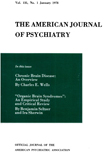INTENSIVE ELECTROSHOCK TREATMENT WITH REITER APPARATUS
Abstract
A series of 34 depressions was treated with the Reiter Electro-Stimulator, which is a machine giving a unidirectional current. In view of the rather noticeable absence of confusion with this apparatus, it was decided to treat these patients intensively. Treatment was therefore administered in a relatively short period, so that 30 of the 34 cases were completed successfully within 12 days and 23 of the 34 in a week or less. All the patients got well and have remained well for months afterwards. The number of treatments ranged, in 30 of the 34 cases, from 3 to 8, given within 2 to 12 days. Four of the 34 presented special problems, and 2 of these 4 showed a rather interesting psychotic reaction that could not be entirely explained by the form of treatment administered.
Comparison with the classical technique, which is given 2 or 3 times a week, showed that favorable results were achieved with our technique in a shorter time without any undue complications. The general form of treatment followed was to give the patient 2 treatments the first day and one thereafter for the next 2 or 3 days, by which time the patients usually improved, and then there was a tapering off, when rest days would be interposed. Sometimes if the improvement manifested itself right away the rest days were interposed earlier.
It is our impression, because of the appreciable shortening of the time required for treatment and the relative absence of complications, that this form of treatment is indicated in depressions.
Access content
To read the fulltext, please use one of the options below to sign in or purchase access.- Personal login
- Institutional Login
- Sign in via OpenAthens
- Register for access
-
Please login/register if you wish to pair your device and check access availability.
Not a subscriber?
PsychiatryOnline subscription options offer access to the DSM-5 library, books, journals, CME, and patient resources. This all-in-one virtual library provides psychiatrists and mental health professionals with key resources for diagnosis, treatment, research, and professional development.
Need more help? PsychiatryOnline Customer Service may be reached by emailing [email protected] or by calling 800-368-5777 (in the U.S.) or 703-907-7322 (outside the U.S.).



